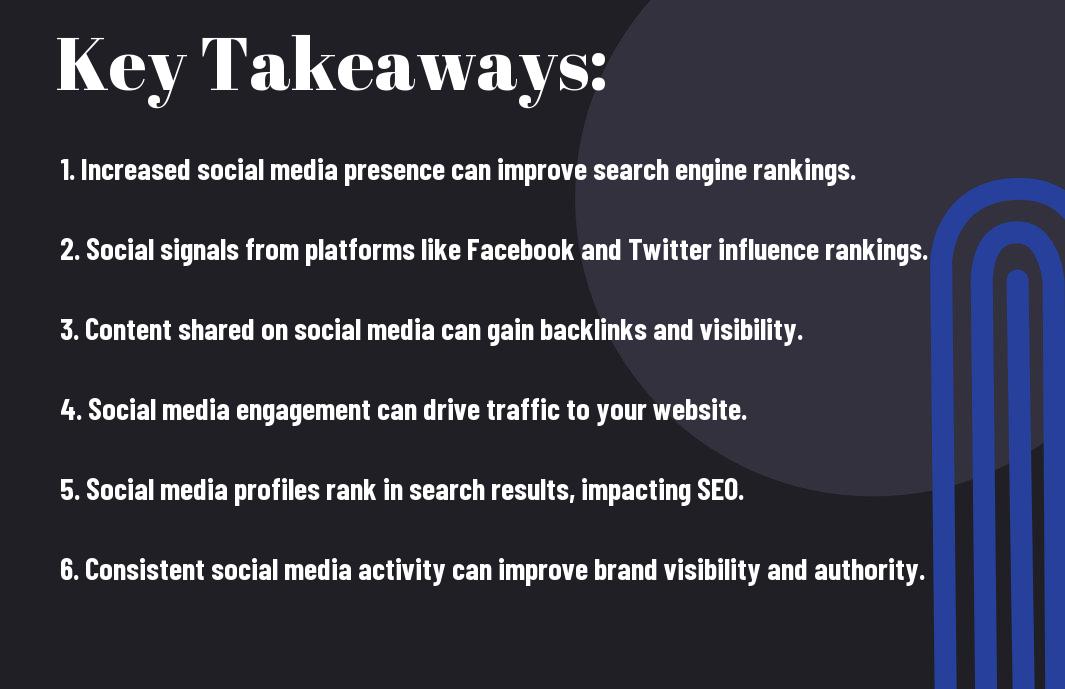Understanding the interplay between social media and search engine optimization (SEO) is crucial for your online presence and visibility. Social media platforms have become more than just a way to connect with friends and family; they are now powerful tools for boosting your website’s SEO. By leveraging the potential of social media, you can significantly improve your search rankings and drive more organic traffic to your site. From increasing brand awareness to building high-quality backlinks, social media can have a profound impact on your SEO efforts. However, it’s essential to navigate the complexities of social media algorithms and user engagement to fully harness its potential for SEO. In this blog post, we will delve into the various ways social media can influence your SEO and provide practical tips on how you can optimize your social media strategy to enhance your website’s search visibility.
Key Takeaways:
- Social signals can impact SEO: The level of engagement and interaction on social media platforms can affect a website’s search engine ranking, as search engines view social signals as a sign of a website’s authority and relevance.
- Content sharing is crucial: Sharing high-quality content on social media can lead to increased visibility and traffic, which can positively impact a website’s SEO.
- Social media profiles appear in search results: Social media profiles often appear in search results, improving a brand’s online presence and providing additional opportunities for visibility.
- Backlinks from social media can boost SEO: Quality backlinks from social media platforms can contribute to a website’s link profile, enhancing its authority and trustworthiness in the eyes of search engines.
- Consistency and engagement are key: Consistently posting and engaging with the audience on social media can help to establish a strong online presence, which can ultimately have a positive impact on SEO.

The Mechanics of Social Media and SEO
The impact of social media on SEO is significant, and understanding the mechanics of how it works is key to leveraging these platforms effectively. When it comes to SEO and social media, there are several important factors to consider that can influence your search engine rankings. According to How Social Media Helps SEO [Final Answer], social media signals can have a direct impact on your website’s visibility in search results. By understanding these mechanics, you can optimize your social media strategy to improve your SEO efforts.
Signals That Influence SEO
Social media signals, such as likes, shares, and comments, can have a significant influence on your SEO. When your content receives engagement on social media, it sends a signal to search engines that your content is valuable and relevant. This can positively impact your search rankings, as search engines prioritize content that is popular and being shared by users. Additionally, social media profiles and pages themselves can also rank in search results, providing another opportunity for visibility for your brand. It’s essential to pay attention to these signals and use them to your advantage to improve your SEO performance.
Content Distribution and Link Building on Social Platforms
One of the key benefits of social media for SEO is the ability to distribute your content and build links on these platforms. When you share your content on social media, you are increasing its visibility and reach, which can lead to more traffic and potential backlinks to your website. Additionally, when other users share your content, it creates opportunities for natural link building, which is a crucial factor in SEO. By strategically leveraging social media for content distribution and link building, you can improve your website’s authority and relevance, ultimately boosting your search engine rankings.
Social Media Platforms and SEO Strategies
Keep in mind that social media platforms can have a significant impact on your website’s search engine optimization (SEO) efforts. By understanding how to leverage these platforms effectively, you can enhance your overall SEO performance and boost your website’s visibility in search engine results. For a more in-depth understanding of how social media SEO impacts page rank, you can read the detailed guide provided by Conductor.
Leveraging Facebook for Improved SEO
Facebook can be a powerful tool for improving your website’s SEO. By creating engaging and shareable content on your Facebook page, you can increase the likelihood of generating backlinks to your website. Additionally, when users engage with your content on Facebook by liking, sharing, or commenting, it sends positive signals to search engines, which can in turn improve your website’s search engine visibility. It’s important to maintain an active presence on Facebook and consistently provide valuable content to your audience to see the best results for your SEO efforts.
Optimizing Twitter for Search Engine Visibility
Twitter is another social media platform that can significantly impact your website’s search engine visibility. By using relevant keywords and hashtags in your tweets, you can increase the chances of your content being discovered by users searching for related topics. Additionally, retweets and likes on Twitter can help amplify the reach of your content, leading to potential backlinks and increased website traffic. However, it’s important to note that Twitter’s fast-paced nature means that your tweets have a shorter lifespan compared to other social media platforms, so it’s crucial to maintain a consistent and active presence on the platform to see the best results for your SEO efforts.

Challenges and Considerations
Unlike traditional SEO strategies, the impact of social media on SEO is often challenging to measure and can present several considerations that you need to take into account. One of the main challenges is the constantly changing algorithms of social media platforms and search engines. This can make it difficult for you to keep up with the latest trends and best practices for leveraging social media for SEO. Additionally, the sheer volume of content and interactions on social media can make it challenging to stand out and get noticed, making it crucial for you to strategize and differentiate your content from the competition.
Measuring the Impact of Social Media on SEO
Measuring the impact of social media on SEO can be a complex task. While social signals, such as likes, shares, and comments, are believed to have some impact on search engine rankings, the exact correlation is not always clear. It can be challenging for you to attribute specific rankings or traffic directly to social media efforts. However, by analyzing the overall increase in brand visibility, traffic, and engagement as a result of your social media activities, you can begin to see the positive impact on your SEO efforts.
The Evolving Social Media Landscape and SEO Adaptation
The social media landscape is constantly evolving, and this requires continuous adaptation of your SEO strategies. New platforms emerge, algorithms change, and user behaviors shift, all of which can impact your SEO efforts. It is essential for you to stay up to date with the latest developments in social media and adjust your SEO strategies accordingly. Failure to adapt to these changes can result in your content becoming less visible or engaging, posing a risk to your overall SEO performance.
The Impact of Social Media on SEO
Now that you understand the impact of social media on SEO, it is clear that these platforms can greatly influence your website’s search engine rankings. By utilizing social media effectively, you can increase your website’s visibility and drive more traffic to your pages. Additionally, social signals from platforms such as Facebook, Twitter, and Instagram can also contribute to your website’s overall credibility and authority in the eyes of search engines. Remember to regularly share your content on social media and engage with your audience to improve your SEO efforts.
FAQ
Q: What is the impact of social media on SEO?
A: Social media can indirectly impact SEO by increasing brand visibility, driving traffic to your website, and generating backlinks which can improve your website’s authority and ranking in search engine results.
Q: How does social media affect search engine rankings?
A: While social media signals themselves do not directly impact search engine rankings, the increased visibility and engagement from social media can lead to more organic backlinks and website traffic, which can ultimately improve your SEO performance.
Q: Which social media platforms are most beneficial for SEO?
A: The most beneficial social media platforms for SEO are those that align with your target audience and industry. However, platforms like Facebook, Twitter, LinkedIn, and Instagram are commonly used for boosting SEO through increased brand visibility and engagement.
Q: What strategies can be employed to leverage social media for SEO?
A: To leverage social media for SEO, it’s important to consistently share high-quality content, engage with your audience, and encourage social sharing. Additionally, participating in relevant industry discussions and using relevant hashtags can also boost your SEO efforts.
Q: Can social media profiles directly impact search engine results?
A: While social media profiles themselves don’t directly impact search engine results, optimizing your profiles with relevant keywords, high-quality content, and links to your website can positively contribute to your overall SEO strategy.
